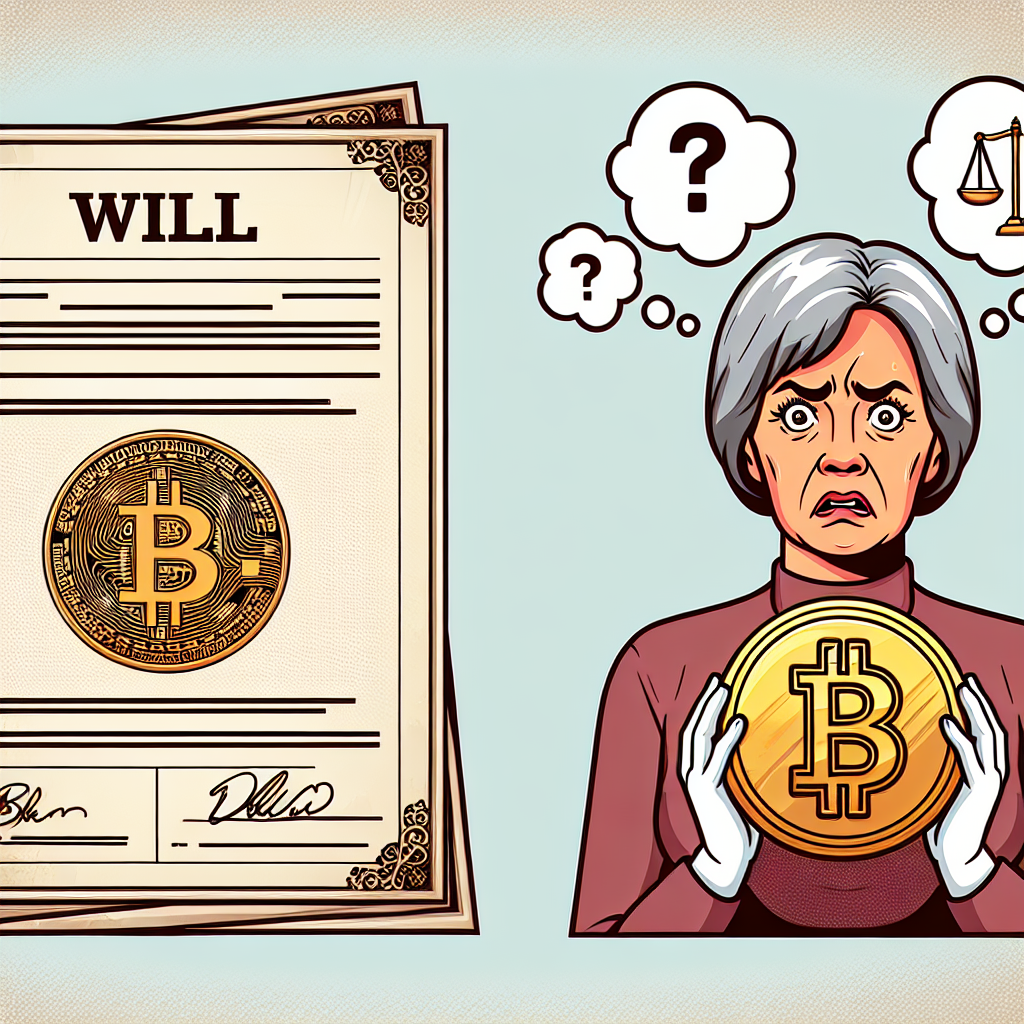
Bitcoin left to me in a Will. What to do as I dont understand it
Introduction to Bitcoin: A Beginner’s Guide
Bitcoin left to me in a Will. What to do as I don’t understand it.
So, you’ve found yourself in a situation where you’ve inherited some Bitcoin, but you have no idea what to do with it. Don’t worry, you’re not alone. Bitcoin can be a complex and intimidating concept for beginners, but with a little guidance, you’ll be able to navigate this new digital currency with ease.
First things first, let’s start with the basics. Bitcoin is a decentralized digital currency that operates on a technology called blockchain. Unlike traditional currencies, such as the US dollar or the Euro, Bitcoin is not controlled by any central authority, like a government or a bank. This means that transactions can be made directly between users without the need for intermediaries.
Now that we have a general understanding of what Bitcoin is, let’s dive into what you should do with the Bitcoin you’ve inherited. The first step is to educate yourself about the world of cryptocurrencies. There are plenty of resources available online, such as articles, videos, and forums, that can help you grasp the fundamentals of Bitcoin.
One important aspect to understand is how to securely store your Bitcoin. Unlike physical money, Bitcoin exists only in digital form. This means that you’ll need a digital wallet to store and manage your Bitcoin. There are various types of wallets available, ranging from software wallets that you can install on your computer or smartphone, to hardware wallets that provide an extra layer of security by storing your Bitcoin offline.
Once you have a wallet set up, the next step is to transfer the Bitcoin from the deceased’s wallet to your own. This process may require some technical knowledge, but there are step-by-step guides available that can walk you through the process. If you’re not comfortable doing it yourself, you can always seek the assistance of a professional who specializes in cryptocurrency.
Now that you have your Bitcoin safely stored in your wallet, you might be wondering what you can do with it. Well, the possibilities are endless. Bitcoin can be used to make purchases online, invest in other cryptocurrencies, or even trade on cryptocurrency exchanges. Some businesses even accept Bitcoin as a form of payment, so you might be able to use it to buy goods and services directly.
It’s important to note that the value of Bitcoin can be highly volatile. This means that its price can fluctuate dramatically in a short period of time. While this volatility can present opportunities for profit, it also carries risks. It’s advisable to do thorough research and consult with experts before making any investment decisions involving Bitcoin.
Lastly, don’t be afraid to reach out to the Bitcoin community for support and guidance. There are countless online communities and forums where you can connect with experienced Bitcoin users who are more than willing to help beginners like yourself. They can provide valuable insights, answer your questions, and help you navigate the world of Bitcoin with confidence.
In conclusion, inheriting Bitcoin can be both exciting and overwhelming, especially if you’re new to the world of cryptocurrencies. However, with a little education and guidance, you’ll be able to confidently manage and make the most of your newfound digital wealth. Remember to take it one step at a time, seek assistance when needed, and always stay informed about the latest developments in the world of Bitcoin. Happy investing!
Understanding Bitcoin: How it Works and its Potential

Bitcoin left to me in a Will. What to do as I don’t understand it.
If you find yourself in the situation of inheriting Bitcoin through a Will, you may feel overwhelmed and unsure of what to do. Bitcoin, a digital currency that operates on a decentralized network, can be confusing for those who are not familiar with it. However, understanding Bitcoin and its potential can help you make informed decisions about what to do with your newfound digital assets.
Firstly, it’s important to grasp the basics of how Bitcoin works. Unlike traditional currencies, Bitcoin is not issued or regulated by any central authority, such as a government or a bank. Instead, it operates on a technology called blockchain, which is a public ledger that records all transactions made with Bitcoin. This decentralized nature of Bitcoin ensures transparency and security, as transactions are verified by a network of computers rather than a single entity.
To access and manage your inherited Bitcoin, you will need a digital wallet. A wallet is a software application that allows you to store, send, and receive Bitcoin. There are various types of wallets available, including online wallets, mobile wallets, and hardware wallets. Each has its own advantages and security measures, so it’s essential to choose one that suits your needs and level of comfort.
Once you have set up your wallet, you can start exploring the potential of Bitcoin. Bitcoin has gained popularity as a form of investment, with many people buying and holding it in the hopes of its value increasing over time. This investment strategy is often referred to as “HODLing,” a term derived from a misspelling of “hold” in a Bitcoin forum. However, it’s important to note that Bitcoin’s value can be volatile, so it’s crucial to do thorough research and consider your risk tolerance before making any investment decisions.
Another potential use for Bitcoin is as a medium of exchange. Although not as widely accepted as traditional currencies, an increasing number of businesses and online platforms are starting to accept Bitcoin as a form of payment. This can provide you with the opportunity to use your inherited Bitcoin to purchase goods and services directly, without the need to convert it into traditional currency.
If you are not comfortable with managing your Bitcoin on your own, you can also consider seeking professional assistance. There are companies and individuals who specialize in helping individuals navigate the world of Bitcoin and other cryptocurrencies. They can provide guidance on managing your digital assets, securing your wallet, and even assist with tax implications.
In conclusion, inheriting Bitcoin can be a unique and potentially valuable asset. While it may seem daunting at first, taking the time to understand Bitcoin and its potential can help you make informed decisions about what to do with your newfound digital wealth. Whether you choose to hold onto it as an investment, use it as a medium of exchange, or seek professional assistance, the key is to approach it with an open mind and a willingness to learn. With the right knowledge and guidance, you can navigate the world of Bitcoin and make the most of your inheritance.
Bitcoin Investment Strategies: A Comprehensive Overview
Bitcoin Investment Strategies: A Comprehensive Overview
So, you’ve found yourself in possession of some Bitcoin that was left to you in a will. Congratulations! However, if you’re like many people, you may be feeling a bit overwhelmed and unsure of what to do next. Don’t worry, we’re here to help guide you through the process and provide you with a comprehensive overview of Bitcoin investment strategies.
First and foremost, it’s important to understand that Bitcoin is a digital currency that operates on a decentralized network called blockchain. Unlike traditional currencies, Bitcoin is not controlled by any central authority, such as a government or a bank. This means that it is not subject to the same regulations and restrictions as traditional currencies.
Now that we have a basic understanding of what Bitcoin is, let’s dive into some investment strategies that can help you make the most of your newfound digital wealth.
One popular strategy is known as “HODLing,” which stands for “Hold On for Dear Life.” This strategy involves holding onto your Bitcoin for the long term, regardless of short-term price fluctuations. The idea behind HODLing is that Bitcoin has the potential to increase in value significantly over time, so it’s best to hold onto it and ride out any market volatility.
Another strategy to consider is dollar-cost averaging. This involves investing a fixed amount of money into Bitcoin at regular intervals, regardless of its price. By doing this, you can take advantage of both high and low prices, ultimately reducing the impact of market volatility on your investment.
If you’re looking for a more active approach, you might consider day trading or swing trading. Day trading involves buying and selling Bitcoin within a single day, taking advantage of short-term price movements. Swing trading, on the other hand, involves holding onto Bitcoin for a few days or weeks, aiming to profit from larger price swings.
Of course, it’s important to note that day trading and swing trading can be risky, especially for beginners. It requires a deep understanding of market trends and technical analysis. If you’re not comfortable with this level of risk, it may be best to stick with a more passive strategy like HODLing or dollar-cost averaging.
Additionally, it’s crucial to stay informed about the latest news and developments in the world of Bitcoin. This will help you make informed investment decisions and stay ahead of any potential market shifts. There are numerous online resources, such as news websites and forums, where you can stay up to date with the latest information.
Lastly, it’s always a good idea to consult with a financial advisor or investment professional before making any significant investment decisions. They can provide you with personalized advice based on your financial goals and risk tolerance.
In conclusion, if you find yourself in possession of Bitcoin that was left to you in a will, it’s essential to educate yourself about the various investment strategies available. Whether you choose to HODL, dollar-cost average, or engage in more active trading, understanding the risks and rewards associated with each strategy is crucial. Stay informed, seek professional advice, and most importantly, enjoy the journey of navigating the exciting world of Bitcoin investment.
UPDATE.
i have some experience in IT and crypto and I would say that when i was learning it was like learning Japanese. The lingo was young tech nerd speak. FUD, FOMO, HODL, charts, head and shoulder patterns, 50% dumps and rises in hours, one minute rich and another minute poor. Then the World was saying its a pyramid scheme, its used by crooks only to see these same organisations push the market down, buy on the dip by FUD (fear, uncertainty, doubt) and then create Fear of Missing Out (FOMO) to push the markets and their crypto higher. Rinse and repeat make money. ALL this is too much and the big financial intitutes like Black Rock, Fidelity, JP Morgan, ARK bring in legal ETF (electronic traded funds) where they, for a small fee, manage all the setting up, cold storage wallets, buy sell, profit and tax for you. So an ETF might be right for you. Thai888 Foundation is receiving Probate with cryto in the asset portfolio and so check with me as crypto has created a unique situation where the cold storage wallet is not bound to a juristiction and so difficult to know how to pay tax as basically its hard to trace. info@thai888.com




